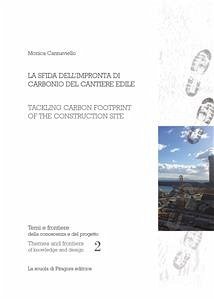Nel processo edilizio, la fase di cantiere gioca la sfida del secolo: contribuire a ridurre l’impronta di carbonio del settore delle costruzioni, in relazione sia al consumo di risorse non rinnovabili, che alle emissioni inquinanti. La ricerca scientifica internazionale ha sancito che non è più sufficiente il controllo degli impatti energetici ed ambientali nella fase di esercizio, ma è necessario analizzare il bilancio di risorse durante tutto il ciclo di vita, ragionando in termini di energia e carbonio incorporati. La misura del trend è data dall’impronta di carbonio. I consumi energetici imputabili al cantiere sono responsabili dell’emissione di enormi quantità di CO2, ed è quindi necessario individuare strategie efficaci per facilitarne la riduzione. Intervenire sui servizi logistici per il cantiere può rappresentare un opportunità.In the construction process, the construction site phase plays the tackle of this century: contributing to reduce the carbon footprint of the building sector, in relation to both the consumption of non-renewable resources and polluting emissions. The international scientific research has established that it is not sufficient the control of the energy and environmental impacts in the exercise phase anymore, but it is necessary to analyse the resources budget throughout the entire life-cycle, reflecting on terms of embodied energy and carbon. The measurement of the trend is given by the carbon footprint. The energy consumptions attributable to the construction site are responsible for the emissions of large amounts of CO2, so it is necessary to identify efficient strategies to facilitate their reduction. Intervening on site logistics can represent an opportunity.
Bitte wählen Sie Ihr Anliegen aus.
Rechnungen
Retourenschein anfordern
Bestellstatus
Storno









